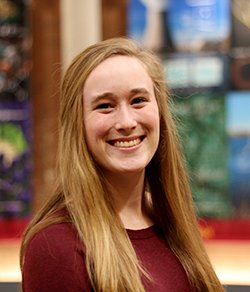Student Profile: Rena Weis

Rena Weis (BEnvE 2017) grew up on a hobby farm in New Prague, Minnesota, and developed an interest in how things grow and how people interact with the earth. In eight grade, while searching for a science project, she saw a story about biochar, a charcoal-like soil amendment produced from organic waste products, and how it led to fertile crops in the Amazon Basin. Her parents helped her set up some test plots where she could grow corn with charcoal. Her homegrown research grew well and developed into a four-year project that carried her to several international science fairs (ISWEEEP (2x), Intel ISEF (2x), and BioGENEius Challenge) and to a high school internship at a USDA Soil Science Laboratory on the St. Paul campus of UMN.
Weis began her academic career as a biology student. Through the CAPE Program (Center for Academic Planning and Exploration) at UMN, she explored her interests and options. She met with Prof. Raymond Hozalski and learned about the new major in environmental engineering. She was drawn to the mix of math, biology, chemistry, and physics - and happy she didn't have to choose just one!
The water chemistry and hydrology classes have proven to be challenging and rewarding for her. She also likes learning advanced chemistry principles and seeing the applications to real world water issues. In one class, her team was assigned a contaminated site and analyzed options for remediation.
Her sophomore year, Weis connected with the St. Anthony Falls Laboratory through the Undergraduate Research Opportunities Program (UROP). Weis helped analyze sediment samples collected from agricultural ditches around St. Peter, Minnesota, measuring nitrate and nitrite levels in agricultural ditches. However, the data revealed no clear pattern of denitrification rates. Weis is philosophical about the results, "That is how research goes sometimes." She presented the project at the National Conference on Undergraduate Research in Asheville, North Carolina, and at the American Water Works Association Annual Conference in Duluth.
"I've always been a self-starter and I like to keep busy!"
Upon declaring a major in Environmental Engineering, Weis became involved in several student organizations. She has served as President of APWA, Secretary of ASCE, and is a member of SWE, Tau Beta Pi, and Chi Epsilon. She also serves as a Peer Mentor through the College of Science and Engineering and is on the CEGE Students Board. "I've always been a self-starter and I like to keep busy!"
After her sophomore year, Weis interned with the City of Bloomington's Stormwater Resources Department. She enjoyed seeing the city side, being a steward of the people. She did a lot of fieldwork, making observations, taking measurements, and doing construction inspections. Last summer, Weis completed a second internship in the consulting field with Barr Engineering. This coming summer she will be interning at Wenck, and hopes to continue working there part time as she completes her Master's degree at UMN. She plans to specialize in environmental engineering.
All these projects helped prepare Weis for her Capstone project, which she is completing this term. Her team is analyzing the effects of 100-year flood around a pond in Edina, Minnesota, and preparing a feasibility report on options to mitigate risk to homeowners in the floodplain. The team mentors, Ross Bintner and Jessica Wilson from the City of Edina, will use the students' report when talking with the city and the public about options. The team is learning about stormwater standards and practices and using software to model storms and intervention options.
Weis has been supported in her studies by a variety of scholarships. When awarded a scholarship, Weis has often been asked to attend a ceremony, sometimes in conjunction with a professional conference. These situations allow her to sit in on technical sessions and to talk with engineers. Over her four years, Weis has become familiar with participants in the small community of environmental, water resources, and municipal professionals. That familiarity, she feels, with be a big help when she finishes her degree and starts to apply for full time jobs in environmental engineering.